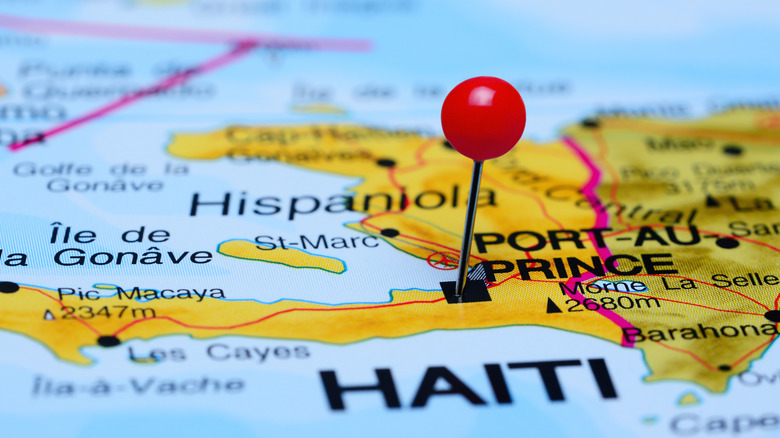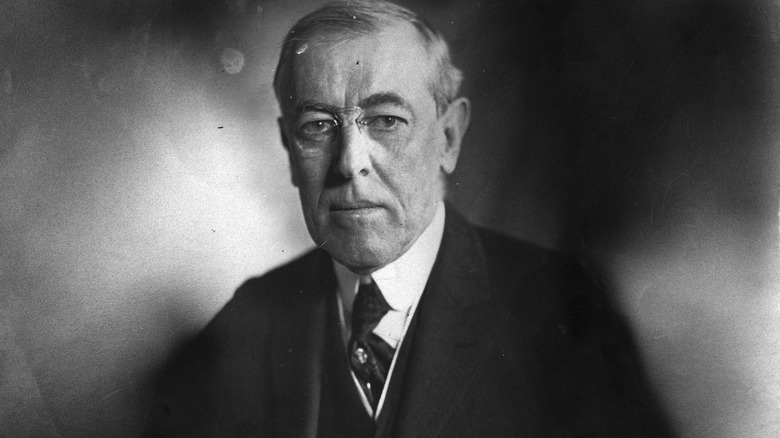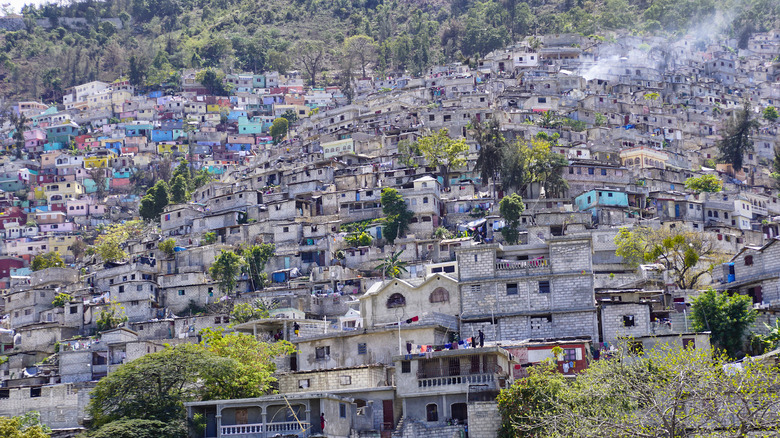How Big Banks Provoked US Involvement In Haiti
The small island nation of Haiti has long been a byword for disaster, a nation that has been unable to retain a democratically elected government or emerge from poverty. The U.S. has stepped in to manage Haiti's affairs multiple times, but not always for the most enlightened reasons.
Forgetting for a moment that the U.S. sought to punish Haiti early in its history for being an island of freed slaves, American intervention in the political life of the small Caribbean island has sometimes seemed like a necessity (via Brown). Haiti has often been volatile and is located dangerously close to the U.S.
Leading up to 1915, Haiti went through seven presidents in less than five years (via The Washington Post), and it was during this period that the U.S. began intervening Haitian affairs more directly. According to the U.S. State Department, around the same time, Germany also began taking an interest in the island, something the U.S. could not allow.
So far, so reasonable? Well, maybe not. A New York Times investigation into the Wall Street giant Citigroup uncovered some nefarious financial motives behind U.S. interference during this era. It is well known that in 1914, U.S. marines confiscated $500,000 worth of gold from Haiti's central bank to take control of the island — but it is less well known that the president of City Bank, Roger L. Farnham, asked Woodrow Wilson to do it (via The New York Times).
Why did Wall Street care about Haiti?
During the 19th century, Haiti was already mired in serious debt. The small island nation had been forced to pay France huge sums of money to retain their independence and prevent an invasion (via Jacobin). Farnham's City Bank was one of the groups that wound up in control of this lucrative debt, and he knew that intervention would allow him to avoid any potential risk connected to the money (via the LSE).
Declaring that control of Haitian trade would be highly beneficial for American business, Farnham's call for American interference was taken very seriously (via The New York Times). Although Secretary of State William Bryan was uncomfortable with Farnham's business-motivated goals, the operation went ahead anyway, and the gold taken for Haiti wound up in City Bank's safes. One year later, in 1915, the U.S. occupied the island, and stayed there for almost 20 years until 1934.
The justifications given for the takeover by City Bank employees were both stunningly racist and appallingly greedy. Farnham himself referred to the Haitians as children, and City Bank manager John Allen, described the country as a profitable land that belonged in white hands, calling Haiti "truly a virgin territory ready for the white man's guiding mind to help it to get back to the conditions existing when, as history tells us, Haiti was the richest of all the colonies of France" (via the LSE).
Vested interests
During the U.S. occupation, Haiti's assets wound up in American hands, and the American regime that controlled the country quickly descended into appalling violence. All infrastructure projects created to improve the island were built using indentured labor. Those who refused to work for free on railroads and other similar projects were regularly shot (via The New York Times).
Farnham himself received of one of these railroads, one of his many gains from the occupation. Reversing most of the social and political progress Haiti made during its bid for independence, American investors bought up Haitian land and took over Haiti's most lucrative industries — sugar and pineapple plantations (via The Washington Post).
Haitian debt was now fully under American control, and City Bank did very well out of the takeover, making a huge profit on Haitian debt in the 1920s and '30s. Even after the U.S. withdrew in 1934, Haitian debt remained in American hands, and many Americans retained their positions on the board of Haiti's central bank (via Jacobin). The U.S. only relinquished control of Haiti's financial system years later, in 1947 (via NPR).
Today, the brunt of the blame for Haiti's grinding poverty and political failures still tends to fall on France, who created Haiti's insane debt in the first place. Calls for reparations from the old imperial power are still ongoing


